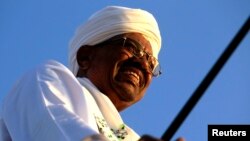Monday was the deadline for a seven-day period given by a South African court for the government to explain why it defied its order to detain Sudanese President Omar al-Bashir.
Bashir is under two indictments by the International Criminal Court for alleged war crimes and crimes against humanity.
South Africa’s main opposition Democratic Alliance (DA) has called on the public prosecutor to investigate the government’s decision not arrest Bashir.
James Selfe, chairperson of the DA’s federal executive, said there is evidence of an “elaborate and well-coordinated plot” by President Jacob Zuma’s office and security services to facilitate Bashir’s departure.
“Our party believes that there are very serious issues at stake here, not only because [South Africa is] signatory of the Rome Statute and one of the countries that has incorporated that statute into our domestic law, we allowed President al-Bashir into the country, we did not arrest him, [and] we did not give him up to the International Criminal Court,” he said.
More seriously, Selfe said, the South African government defied its own domestic court order.
“Our court made an order that he (al-Bashir) should not leave the country until we had established whether or not he deserves to be arrested, and our own government, our president and several of ministers of state conspired to allow him to leave in defiance of a court order,” he said.
The government said it did not defy the court and promised to abide by the court’s order to submit an explanation by Monday on how and why Bashir left the country after attending an African Union summit.
Meanwhile, the Democratic Alliance said it has requested was granted permission to hold an urgent debate on the issue in the South Africa parliament on June 23.
“On that occasion, we will demand answers from the South African government and its ministers about how the situation arose in the first place, how it was possible that President al-Bashir was allowed to leave the country, and what the government was thinking of in defying both international and domestic laws in that situation,” he said.
Erastus Mwencha, deputy chairperson of the AU commission told VOA that when a country agrees to host the AU summit, it signs what is called a “host agreement” which extends privileges and immunities to all those attending the meeting.
In addition, Mwencha said the venue of the summit is an extended territory of the African Union. As such, Mwencha said, Bashir was within the territory of the AU and the South African court could not have had any jurisdiction unless the government reneged on the AU statute.
“In terms of our domestic law, it said that in spite of the fact that one is a president or a minister or a member of parliament that does grant immunity from prosecution in terms of our understanding of the Rome Statute in terms of its applicability to South African law,” he said.
Selfe said his party’s demand for a complete investigation into the Bashir departure does not mean the DA agrees with everything the ICC does when it comes to Africa.
He said South Africa is bound by its international and domestic agreements until it chooses to default on its commitment to the Rome Statute. Otherwise, Selfe said, South Africa will look like a laughingstock in the eyes of the international community.





